Fantasia Focus: Guardians of the Galaxy
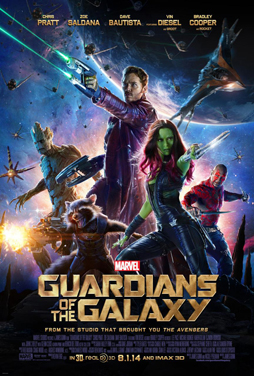 I’m going to break from the chronological record I’ve been keeping of the Fantasia Festival to write a bit here about a movie I saw last night. I’m going to do this on the off chance that my doing so may help some of you decide what you’ll be doing with a couple hours of your upcoming weekend. On Tuesday at 7:30, Fantasia presented the Canadian premiere of Guardians of the Galaxy and I was there.
I’m going to break from the chronological record I’ve been keeping of the Fantasia Festival to write a bit here about a movie I saw last night. I’m going to do this on the off chance that my doing so may help some of you decide what you’ll be doing with a couple hours of your upcoming weekend. On Tuesday at 7:30, Fantasia presented the Canadian premiere of Guardians of the Galaxy and I was there.
It’s a fun, fine movie. It’s not a great movie, I feel, and not even the greatest Marvel movie — I didn’t think it was as good as The Avengers or Captain America 2. But it’s another solid entry in Marvel’s growing filmography. That said, it’s not really a super-hero movie, but space opera: a group of ragtag adventurers in outer space come together when the retrieval of a mysterious artifact from a dead world leads to the emergence of a threat to the galaxy. Directed by James Gunn from a script by Gunn and Nicole Perlman, it moves swiftly and easily over familiar terrain, primarily using ideas and concepts from Dan Abnett and Andy Lanning’s excellent run on Marvel’s space-oriented comics — notably Nova and Guardians of the Galaxy.
It’s filled with adventure and action scenes. It’s also filled with humour, and largely successful humour at that. The characters are engaging, with each of the heroes distinctive and developed as individuals — though the villains of the piece are underplayed. There are moments of real strangeness, though I’m not sure the richness of the ideas in the original comics always come across. And the worldbuilding — or galaxybuilding — is so minimal that the scope of the film feels limited as a result. Still, this is a tightly-constructed high-velocity movie with a surprising amount of warmth. It’s a story about outcasts coming together for the common good and learning to be better as a group than they could have been apart. There’s nothing revolutionary about that, but Guardians does the old idea well.
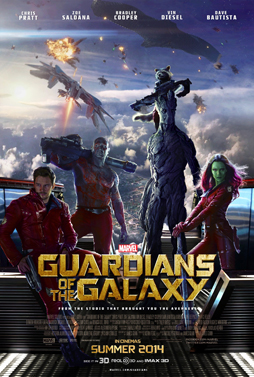 (A few details to mention before we continue. I saw the movie in 3D. I saw one mid-credits sequence, but there will be a second post-credits sequence attached to the film once it goes into general North American release on August 1. And, for the record, while I’ve gotten in to see all the other movies at the Fantasia Festival with a media pass, for this one I had to shell out for a ticket myself.)
(A few details to mention before we continue. I saw the movie in 3D. I saw one mid-credits sequence, but there will be a second post-credits sequence attached to the film once it goes into general North American release on August 1. And, for the record, while I’ve gotten in to see all the other movies at the Fantasia Festival with a media pass, for this one I had to shell out for a ticket myself.)
Chris Pratt plays Peter Quill, a human who was abducted from Earth as a child and now wanders the galaxy as the roguish interstellar outlaw Star-Lord. The film begins with his recovering a metal orb desired by various other entities, leading to an assortment of chase scenes and a price being put on his head. Specifically, the evil Ronan the Accuser (Lee Pace), a radical adherent to the traditions of the Kree Empire, wants the orb to give to the mad titan Thanos (Josh Brolin) in exchange for Thanos’s help in destroying the planet Xandar, enemy of the Kree and home to the heroic Nova Corps. Before Ronan can get ahold of him, though, Quill’s arrested and sent to the interstellar prison called the Kyln, where he meets a number of other oddballs, some of whom he’s already fought by this point in the movie. They break out as a group, and set out to deal with the orb before it falls into the wrong hands.
The other Guardians of the Galaxy are the green-skinned Gamora, played by Zoe Saldana, who has betrayed Ronan and Thanos; Drax the Destroyer, played by Dave Bautista, who seeks vengeance on Ronan for the death of his family; the cunning and violent bounty hunter Rocket, a genetically and cybernetically modified animal voiced by Bradley Cooper; and Groot, a walking tree with a limited vocabulary, given voice by Vin Diesel. Opposing them are Thanos, Ronan, and Nebula (Karen Gillan) — who, like Gamora, is an adopted daughter of Thanos. Caught in the middle are the Xandarians, led by Glenn Close as Nova Prime. Meanwhile, the space pirate who abducted Quill from Earth, Yondu (Michael Rooker), is trying to capture him again. And there is also the mysterious Collector (Benicio Del Toro), who will pay handsomely for the mysterious orb.
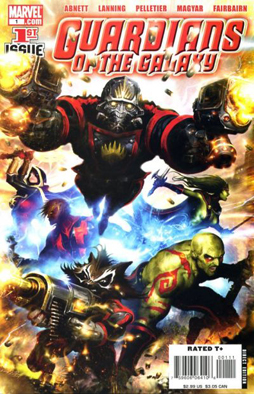 This all sounds hellaciously complicated, but it plays out easily and naturally on screen. The villains do get short shrift, with comparatively little screen time or information on their motivations. The movie’s main focus is on its heroes, and their development. This works, although the number of characters driven by missing or dead family members starts to seem excessive. Still, because the characters play well off of each other, the movie by and large succeeds.
This all sounds hellaciously complicated, but it plays out easily and naturally on screen. The villains do get short shrift, with comparatively little screen time or information on their motivations. The movie’s main focus is on its heroes, and their development. This works, although the number of characters driven by missing or dead family members starts to seem excessive. Still, because the characters play well off of each other, the movie by and large succeeds.
I did think the acting was hit-and-miss. Pratt’s an effective leading man, and his Star-Lord’s sympathetic. Bautista’s Drax is quite effective as well. I found Saldana’s Gamora overly earnest, and Cooper’s Rocket unsubtle. Vin Diesel successfully makes the most of very little with Groot. Gillan is excellent in a small role, but Glenn Close is a disappointment, seeming lost, as though she never connected with the material.
Structurally, the movie vaguely resembles the original Star Wars — start with a young hero, who’s soon thrust into a scuzzy criminal environment, move to an extended middle sequence on board a space station, conclude with a big final battle with the life or death of a planet riding on the result. The opening’s more like Raiders of the Lost Ark, though, which the movie seems to acknowledge when Quill refers to the orb he’s acquired as being like the Ark of the Covenant or the Maltese Falcon. It’s a clever line, but it does point out the inherent Macguffinness of the thing. And at a certain point, if only after the movie ends, you do notice unanswered questions in the backstory. How did Gamora strike a deal with the Collector? Who hired Yondu? And how did such a cosmically important orb come to be lying abandoned on that planet in the first place?
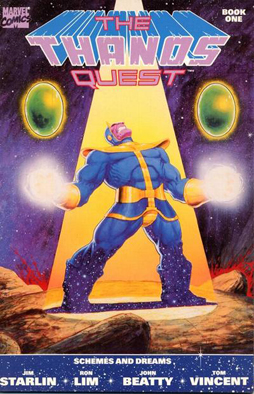 Oddest of all is the movie opening up a new subplot, to do with Quill’s parentage, in its closing moments. It seems to be setting up something to be explored in the sequel (announced a few days ago at the San Diego Comic-Con). It’s not entirely out of the blue, in that Quill’s background and distance from his parents is a sub-theme throughout the movie. But it’s an odd twist, and it doesn’t help that in some other ways it’s difficult to know what to make of Quill’s character. He’s set up as a kind-hearted scoundrel, and so is given a history of philandering. Which makes you wonder, when the inevitable romance develops with Gamora, whether their relationship is any different from the ones he’s had before. He does save her life at considerable risk to his own, but is that a sign of special feeling or of a general self-sacrificing nature? It’s hard to say.
Oddest of all is the movie opening up a new subplot, to do with Quill’s parentage, in its closing moments. It seems to be setting up something to be explored in the sequel (announced a few days ago at the San Diego Comic-Con). It’s not entirely out of the blue, in that Quill’s background and distance from his parents is a sub-theme throughout the movie. But it’s an odd twist, and it doesn’t help that in some other ways it’s difficult to know what to make of Quill’s character. He’s set up as a kind-hearted scoundrel, and so is given a history of philandering. Which makes you wonder, when the inevitable romance develops with Gamora, whether their relationship is any different from the ones he’s had before. He does save her life at considerable risk to his own, but is that a sign of special feeling or of a general self-sacrificing nature? It’s hard to say.
And in general I think the adaptation does poorly by the women in the film. That is, there’s a good argument that all the female characters are diminished in the process of adaptation. Nebula, sinister leader of space pirates, becomes a flunky of a flunky. Gamora doesn’t get many chances to show that she’s “the deadliest woman in the whole galaxy” (a quote from the comics, not the film). And there’s an appearance by a woman named Bereet, who Quill has forgotten he had on board his spaceship; she appeared in some Hulk comics from way back, an interplanetary ‘techno-artist’ who here is merely used to imply Quill’s studliness. Gamora and Nebula do get a distinctive relationship as step-sisters; but knowing the source material, you can see what’s lacking.
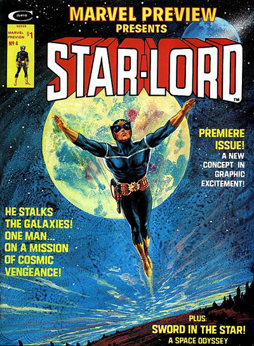 Then again, I found a familiarity with the original comics was frequently an obstacle to enjoying the movie. Many of these characters have decades of continuity behind them, a complexity that a two-hour film can’t match. And of course any adaptation has to change things to make sense with the story that it’s choosing to tell. In this case, most of the changes make narrative sense on their own terms. So Quill and Rocket largely switch personalities — Abnett and Lanning had Quill as the bitter planner and Rocket as the warm-hearted swashbuckler, while the film reverses their roles. Drax is an alien instead of the human he was in the comics, presumably not to interfere with Quill’s status as the only Earthling in the movie (or only human Earthling, at least, as we get a welcome character cameo in the Collector’s lair); he doesn’t change much otherwise, and by the end of the film is very close to the comics’ Drax. I think Ronan the Accuser gets the short end of the stick, losing the gravitas that made him an interesting villain in the comics, but again the movie probably felt it had to establish Thanos as the much grander, looming threat.
Then again, I found a familiarity with the original comics was frequently an obstacle to enjoying the movie. Many of these characters have decades of continuity behind them, a complexity that a two-hour film can’t match. And of course any adaptation has to change things to make sense with the story that it’s choosing to tell. In this case, most of the changes make narrative sense on their own terms. So Quill and Rocket largely switch personalities — Abnett and Lanning had Quill as the bitter planner and Rocket as the warm-hearted swashbuckler, while the film reverses their roles. Drax is an alien instead of the human he was in the comics, presumably not to interfere with Quill’s status as the only Earthling in the movie (or only human Earthling, at least, as we get a welcome character cameo in the Collector’s lair); he doesn’t change much otherwise, and by the end of the film is very close to the comics’ Drax. I think Ronan the Accuser gets the short end of the stick, losing the gravitas that made him an interesting villain in the comics, but again the movie probably felt it had to establish Thanos as the much grander, looming threat.
So knowing the source material is also an obstacle to enjoying the movie because so much has been reinvented; so much has to be reinvented to fit into a single film. You can’t rely on what you think you know about the characters or background. More than that, the movie seemed to choose not to aim at the narrative core either of the Jim Starlin comics that introduced many of these characters or of the Abnett and Lanning run. Starlin’s Captain Marvel and “Adam Warlock” stories were psychedelic cosmic fables, Métal Hurlant done a la Marvel with a kind of Moorcockian emo irony. The Abnett and Lanning books dropped most of the cosmic weirdness in favour of smart and intensely well-crafted military science fiction. The Guardians movie is far from the Starlin books, but also lacks the genre smarts and familiarity with sf convention of the later comics. There’s an absence of cleverness; battle tactics, for example, are simple and sometimes baffling, chosen mainly to move the plot forward and set up climaxes.
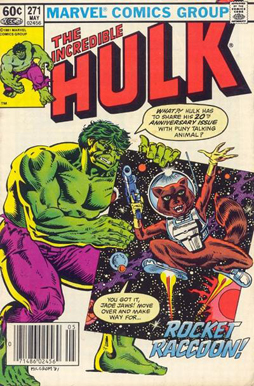 But I wonder whether the absence of the Starlin ‘cosmic zap’ (to borrow Gerard Jones and Will Jacob’s useful term) isn’t more of a problem. If the Guardians recalls Star Wars in many ways, it’s a Star Wars without the Force or the Jedi. There’s a minimal amount of mystic idealism. Nor is there the sense of a coherent galactic setting, with its own politics, of which you get at least a little in Star Wars; we don’t get much of a sense of context for the Kree or the Xandarians, how big their empires are or how important, meaning that we ultimately don’t know how big or important the Guardians’ adventures are. And there is little sense of wonder: all these characters grew up in space, so there’s no feeling of discovery (with the partial exception of their journey to the Collector’s home). This may well be deliberate, a guess at how much newness a general audience will bear. Some of the distinctiveness of the original comics has been discarded for no other obvious reason, such as the original design of the planet Xandar, a series of vast bubbles connected by machinery. Infinity gems are renamed infinity stones. These things individually don’t matter much. But their collective absence, and the absence of anything replacing their distinctiveness, feels like a loss.
But I wonder whether the absence of the Starlin ‘cosmic zap’ (to borrow Gerard Jones and Will Jacob’s useful term) isn’t more of a problem. If the Guardians recalls Star Wars in many ways, it’s a Star Wars without the Force or the Jedi. There’s a minimal amount of mystic idealism. Nor is there the sense of a coherent galactic setting, with its own politics, of which you get at least a little in Star Wars; we don’t get much of a sense of context for the Kree or the Xandarians, how big their empires are or how important, meaning that we ultimately don’t know how big or important the Guardians’ adventures are. And there is little sense of wonder: all these characters grew up in space, so there’s no feeling of discovery (with the partial exception of their journey to the Collector’s home). This may well be deliberate, a guess at how much newness a general audience will bear. Some of the distinctiveness of the original comics has been discarded for no other obvious reason, such as the original design of the planet Xandar, a series of vast bubbles connected by machinery. Infinity gems are renamed infinity stones. These things individually don’t matter much. But their collective absence, and the absence of anything replacing their distinctiveness, feels like a loss.
On the other hand, this is a move with Rocket Raccoon and Groot and Bereet and the Nova Corps. There is a willingness to go deep into Marvel’s history, to pull out characters from the post-Kirby Bronze Age comics. To go past the landmark Marvel comics into the obscurities of their publishing history. None of the characters in this movie have ever been big sellers in comic shops, so, as many people have pointed, building a movie around them is a little audacious. But I think the attempt does succeed. I think Guardians of the Galaxy is a solid, entertaining movie. It has a warmth found in so many of the best mainstream Hollywood films, but puts its own spin on it. It builds a movie out of bits and pieces of Marvel Comics from across decades, and at the same time seems to leave room for growth in sequels. It does what it wants to do, with real humour. I have no idea how it’ll do at the box office, but I think it’s worth watching.
(You can find links to all my Fantasia diaries here.)
Matthew David Surridge is the author of “The Word of Azrael,” from Black Gate 14. His ongoing web serial is The Fell Gard Codices. You can find him on Facebook, or follow his Twitter account, Fell_Gard.
[…] bit under a year ago I saw Guardians of the Galaxy at Fantasia, again with an enthusiastic audience; I liked it, but felt it was missing something, an […]